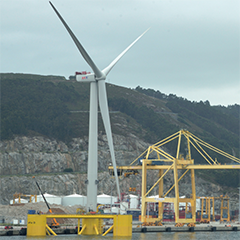PES had an interesting and enlightening meeting with Pieter Jan Jordaens, team leader OWI-Lab and cluster manager of IBN Offshore Energy project, Pieter Mathy, innovation manager at the University of Ghent (UGent) and RD&I catalyst in the IBN Offshore Energy project and Prof Dr Christof Devriendt, R&D coordinator OWI-Lab and associated to the university of Brussels (VUB), board member IBN Offshore Energy project.
It was very informative, we heard about their cluster, which brings together companies in Flanders working in the offshore industry, sharing ideas, technology and innovation. It’s a successful network, one of many such groups in Belgium. Maybe it could be taken up elsewhere. Read on to find out more.
PES: Hi welcome to you all to PES Wind. It’s great to talk with you. Please could you begin with a brief overview of IBN and the reasons behind this cluster and its aim?
Pieter Jan Jordaens: Thank you. We’re very happy to be here to talk about IBN. So, IBN Offshore Energy stands for Innovative Business Network for offshore energy. Simply put, it is an innovation cluster were companies collaborate with each other and knowledge partners on RD&I projects and new business opportunities.
In 2016 the Flemish government of Belgium decided to launch 20 IBN’s in which basically innovation eco-systems were set-up, with companies active in certain industries or applications that are strategically important for the region. Here are some of them: IBN Offshore Energy, IBN Power-to-Gas, IBN Coatings, IBN Composites, IBN Drones, etc…
In 2018 these 20 IBN’s together involved 1083 companies and 234 collaboration initiatives with industry – meaning it is an important tool for companies.
Within the IBN Offshore Energy we house 55 companies that are active in the field of offshore wind energy, which is 95% of the members and wave and tidal energy, the other 5%. The cluster is managed by Sirris, a technology centre. The UGent and VUB universities are partners in the operational management of the IBN.



























